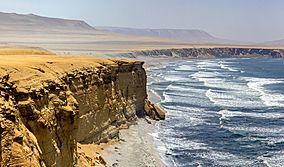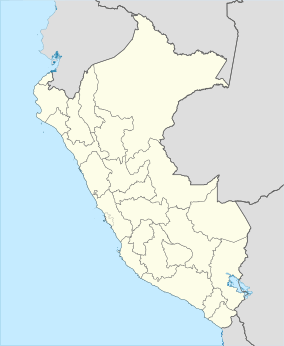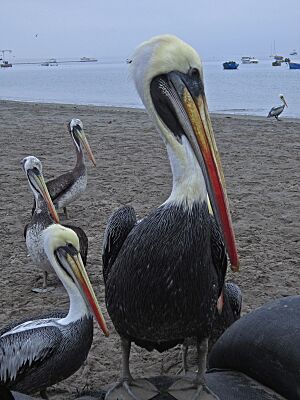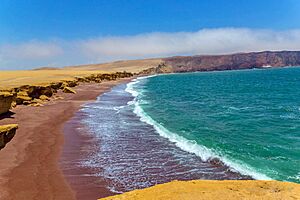Paracas National Reserve facts for kids
Quick facts for kids Paracas National Reserve |
|
|---|---|
| Reserva Nacional de Paracas | |
|
IUCN Category VI (Managed Resource Protected Area)
|
|

Supay beach, at Paracas National Reserve.
|
|
| Location | Ica |
| Nearest city | Pisco |
| Area | 3350 km² |
| Established | 25 September 1975 |
| Governing body | SERNANP |
| Website | Reserva Nacional de Paracas (in Spanish) |
| Official name: Paracas | |
| Designated: | 30 March 1992 |
| Reference #: | 545 |
The Paracas National Reserve is a special protected area in the Ica Region of Peru. It was created to keep the unique desert and ocean environments safe. It also helps people use these natural resources in a way that doesn't harm them. This reserve is also home to ancient ruins from the Paracas culture.
Contents
Where is the Paracas Reserve?
This amazing reserve is located in the Ica region, about 250 kilometers (155 miles) south of Lima, the capital city of Peru. It's also very close to the town of Pisco.
The reserve covers a huge area of 335,000 hectares. Imagine that! More than half of this area, about 65%, is made up of ocean ecosystems. The highest point in the reserve is 786 meters (2,579 feet) above sea level.
The reserve includes many interesting coastal places. These include the Paracas Peninsula, Independencia Bay, San Gallán Island, Paracas Bay, and Independencia Island.
What is the Climate Like?
| Weather chart for Pisco | |||||||||||||||||||||||||||||||||||||||||||||||
|---|---|---|---|---|---|---|---|---|---|---|---|---|---|---|---|---|---|---|---|---|---|---|---|---|---|---|---|---|---|---|---|---|---|---|---|---|---|---|---|---|---|---|---|---|---|---|---|
| J | F | M | A | M | J | J | A | S | O | N | D | ||||||||||||||||||||||||||||||||||||
|
0
27
17
|
0
28
18
|
0
28
18
|
0
26
16
|
0
24
14
|
0
21
13
|
0
21
12
|
0
21
12
|
1
21
12
|
0
22
13
|
0
23
14
|
0
25
16
|
||||||||||||||||||||||||||||||||||||
| temperatures in °C precipitation totals in mm source: Climate-Data.org |
|||||||||||||||||||||||||||||||||||||||||||||||
|
Imperial conversion
|
|||||||||||||||||||||||||||||||||||||||||||||||
The Paracas National Reserve is a very dry place, known as an arid zone. It often has strong local winds called paracas. Rain is very rare here, but when it does fall, it's usually in winter. This rain mostly lands on the tops of the tallest hills. This tiny bit of water is super important for the special "lomas" ecosystems that grow there. The climate information above is from the nearby town of Pisco.
Amazing Plants and Animals
Plant Life in the Reserve
Even though it's a dry place, the reserve has many interesting plants. Some plants found on land include Tiquilia paronychoides, Prosopis pallida, and Tillandsia species. You might also spot Eriosyce omasensis and Geoffroea decorticans.
In the ocean, there are different types of marine algae. These include Ulva lactuca, Chondracanthus chamissoi, and the very large Macrocystis pyrifera, also known as giant kelp.
Animal Life in the Reserve
The Paracas National Reserve is home to a wide variety of animals, especially marine creatures and birds.
Mammals of the Reserve
You can find many amazing mammals here. Some of the ocean mammals include the huge sei whale, the playful dusky dolphin, and the clever marine otter. You might also see sperm whales, humpback whales, and South American sea lions. Even killer whales and common bottlenose dolphins visit these waters!
Birds of the Reserve
Bird watchers will love this place! The reserve is a haven for many bird species. Look out for the majestic Andean condor and the beautiful Chilean flamingo. Other birds include the Peruvian pelican, the unique Inca tern, and the Humboldt penguin. You might also spot the guanay cormorant and the Peruvian diving petrel.
Molluscs and Fish
The waters of the reserve are full of different molluscs like Argopecten purpuratus (a type of scallop) and Concholepas concholepas.
Many kinds of fish swim in these waters too. Some common ones are the Peruvian hake, the flathead grey mullet, and the fast skipjack tuna. You might also see copper sharks, blue sharks, and the tiny Peruvian anchoveta.
Ancient History and Archaeology
The Paracas National Reserve holds more than 100 ancient sites! Many of these belong to the Paracas culture, an ancient civilization famous for their incredible textile crafts. They made beautiful and complex fabrics many centuries ago.
Fun Things to Do
The main activities for visitors in the reserve are enjoying the beaches and watching the amazing wildlife. It's a great place to see animals in their natural home.
See also
 In Spanish: Reserva nacional de Paracas para niños
In Spanish: Reserva nacional de Paracas para niños
 | Shirley Ann Jackson |
 | Garett Morgan |
 | J. Ernest Wilkins Jr. |
 | Elijah McCoy |




